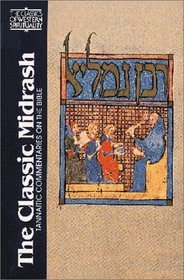Search -
The Classic Midrash: Tannaitic Commentaries on the Bible (Classics of Western Spirituality)
The Classic Midrash Tannaitic Commentaries on the Bible - Classics of Western Spirituality
Do you want to come to know He Who Spoke and the world came into being? Learn haggada (rabbinic lore) for by doing that you will come to know He Who Spoke and the world came into being and hold fast to His ways. Sifre Deuteronomy 49 Midrash (from the Hebrew root "to seek out"), which contains both legendary and legal material, is both a process... more »
Do you want to come to know He Who Spoke and the world came into being? Learn haggada (rabbinic lore) for by doing that you will come to know He Who Spoke and the world came into being and hold fast to His ways. Sifre Deuteronomy 49 Midrash (from the Hebrew root "to seek out"), which contains both legendary and legal material, is both a process... more »
ISBN-13: 9780809104673
ISBN-10: 0809104679
Publication Date: 5/1995
Pages: 528
Rating: ?
ISBN-10: 0809104679
Publication Date: 5/1995
Pages: 528
Rating: ?
0 stars, based on 0 rating
Genres:
- Religion & Spirituality >> Judaism >> General
- Religion & Spirituality >> Judaism >> Sacred Writings >> General
- Christian Books & Bibles >> Bible Study & Reference >> Commentaries >> General




